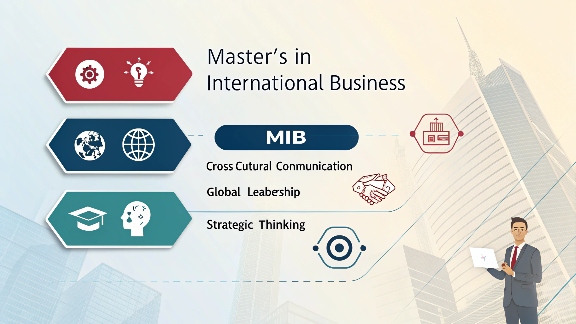In today’s world, businesses are no longer confined to a single country. With globalization connecting people and markets across the globe, there’s a growing need for professionals who can navigate this international landscape. One of the best ways to prepare for a career in global business is by pursuing a Master in International Business (MIB).
This program offers students the knowledge and skills they need to succeed in multinational companies and global markets. In this article, we’ll explore what an MIB is, why it’s worth pursuing, and what you can expect from the program.
What Is MA International Business?
An MA in International Business is a graduate-level program designed to help students understand the complexities of working in a global business environment. It teaches you how to manage businesses that operate in multiple countries, covering areas like global marketing, finance, and trade. This program is perfect for those who want to pursue a career with multinational companies or even start their own international ventures.

You’ll not only learn the theory behind business strategies but also gain practical insights into managing cross-cultural teams and navigating international markets. Plus, the skills you develop—like problem-solving, leadership, and adaptability—are highly valued by employers around the world. Ultimately, this degree opens up numerous opportunities, giving you the tools to succeed in today’s interconnected global economy.
Why Pursue A Master In International Business?
If you’re considering a Master in International Business, you’re probably wondering how it can benefit you in the long run. Well, here are some compelling reasons to pursue this degree:
- Global Career Opportunities: By earning an MIB, you open doors to work in multinational companies and global markets. This degree prepares you to tackle international challenges and seize diverse career paths.
- Networking and Exposure: The program connects you with peers and professionals from all around the world. These relationships enrich your learning experience and can lead to lifelong career opportunities.
- In-Demand Skills: You acquire crucial skills such as cross-cultural communication and strategic thinking. Employers value these abilities, which give you a competitive edge in today’s global economy.
- Personal Growth and Cultural Adaptability: Studying internationally broadens your perspective and enhances your adaptability. This journey not only builds your professional profile but also deepens your understanding of diverse cultures.
- Entrepreneurial Opportunities: An MIB equips you with the knowledge to launch ventures that operate across borders. It’s a great stepping stone if you dream of starting your own business with a global focus.
Curriculum Of A Master In International Business – Must-Have Skills For Global Success!
Now, let’s talk about what you’ll actually learn during an MIB program. While the specific courses may vary depending on the school, there are several key areas of focus that most programs share.
Core Business Subjects:
You’ll start by learning the fundamentals of business. This includes areas like:
- Strategic Management: How to make smart decisions in a global marketplace.
- International Marketing: How to market products and services across different cultures.
- Global Finance: How to manage financial operations in international business.
- Supply Chain Management: Understanding how goods and services are produced and delivered globally.
These subjects provide a solid foundation for understanding the global business landscape.
Specialized Courses:
In addition to core courses, MIB programs usually include specialized topics such as:
- Cross-Cultural Management: Learning how to manage teams from different cultural backgrounds.
- International Trade and Economics: Understanding the economic forces that drive international trade.
- Emerging Markets: Gaining insights into doing business in fast-growing regions like Africa, Asia, and Latin America.
Many programs also offer elective courses, so you can tailor your studies to your interests.
Research And Case Studies:
Another important part of the MIB program is the research component. Through case studies and research projects, you’ll analyze real-world business problems and develop solutions. These exercises help you apply what you’ve learned in the classroom to practical situations.enarios.
Skills Acquired During A Master In International Business – Dont Miss Out!
An MIB program not only teaches you business concepts but also helps you develop a range of practical skills that will be essential for your future career. These include:

Cross-Cultural Communication:
In international business, the ability to communicate effectively with people from different cultures is crucial. You’ll learn how to adjust your communication style to work well with colleagues, clients, and partners from all over the world.
Global Leadership:
You’ll also develop leadership skills tailored for the international business world. This includes learning how to manage teams and make decisions in a global context. The program helps you become a confident leader who can handle the challenges of working in different cultural and business environments.
Strategic Thinking:
As a global business professional, you’ll need to think strategically. You’ll learn how to assess international markets, identify growth opportunities, and develop plans to help companies succeed in the global market.
Problem-Solving and Adaptability:
The international business landscape is constantly changing, and you’ll need to be adaptable. During the program, you’ll learn how to think on your feet and solve problems as they arise. This ability to adjust to new challenges will serve you well in your future career.
Internship And Practical Experience – You Must Read!
Many MIB programs offer internships, which are a great way to gain hands-on experience. Internships allow you to apply the knowledge you’ve gained in the classroom to real-world situations. They also give you the chance to work with multinational companies, government organizations, or non-profits. This experience will make you more attractive to employers when you graduate.
In addition to gaining experience, internships also provide valuable networking opportunities. The connections you make during your internship can help you land a full-time job after you finish the program.
Career Opportunities After Graduation – Why Your Global Career Will Thrive!
Graduates of MIB programs are in high demand. The skills you gain during the program will open the door to a wide variety of career paths. Here are a few examples of jobs you might pursue:

- International Marketing Manager: As an international marketing manager, you’ll create and implement marketing strategies for global markets. This role requires a strong understanding of different cultures and how they influence consumer behavior.
- Global Supply Chain Manager: Supply chain managers are responsible for ensuring that goods are produced, stored, and delivered efficiently across international borders. This job requires knowledge of logistics, operations, and trade regulations.
- Business Development Manager: In this role, you would help companies grow by identifying new business opportunities, exploring new markets, and building relationships with international partners.
- Financial Analyst: As a financial analyst, you would assess financial data, manage investments, and help companies navigate the complexities of international financial markets.
- Entrepreneur: If you’re interested in starting your own business, an MIB provides the tools you need to launch and manage a successful international business.
Salary Expectations For Master In International Business (MIB) Graduates!
After discussing career paths, it’s important to consider the salary expectations for MIB graduates. Generally, graduates of MIB programs earn competitive salaries because of their international expertise. Of course, salaries depend on factors like the industry, location, and your level of experience.
| Career Path | Average Salary (Annual) |
| International Business Manager | $80,000 – $150,000 |
| Global Supply Chain Manager | $70,000 – $120,000 |
| International Marketing Director | $90,000 – $160,000 |
| Trade Compliance Analyst | $60,000 – $110,000 |
| Foreign Policy Advisor | $75,000 – $130,000 |
Salary Expectations Based on Career Stage:
| Career Stage | Salary Range (Annual) |
| Entry-Level Positions | $50,000 – $80,000 |
| Mid-Career Roles | $90,000 – $150,000 |
| Senior Executives | $150,000 – $300,000+ |
Top Universities Offering Master In International Business – Need To Know!
Several prestigious universities around the world offer a Master in International Business, each providing unique opportunities and programs. Some of the top institutions offering an MIB program include:
- IÉSEG School of Management (France): IÉSEG offers an international business program that focuses on leadership, global strategy, and cross-cultural management. The program is available in both the Paris and Lille campuses.
- ESCP Business School (France, UK, Spain, Germany, Poland): ESCP’s MIB program is designed to equip students with the tools necessary for navigating international business, including global marketing, international finance, and cross-cultural leadership.
- Universidad de los Andes (Colombia): This MIB program provides students with a solid foundation in international business strategy, global marketing, and operations management, with a focus on Latin American markets.
- University of St. Gallen (Switzerland): Known for its international approach, the University of St. Gallen offers an MIB program with an emphasis on global leadership and sustainable business practices.
- The University of Melbourne (Australia): The Melbourne Business School offers a Master of International Business that focuses on global business dynamics, offering a diverse and multicultural environment.
Admission Requirements And Process:
Most programs require:
- Bachelor’s degree (any discipline)
- English proficiency (IELTS/TOEFL)
- GMAT/GRE (sometimes optional)
- Statement of Purpose (SOP)
- Letters of Recommendation
- Work experience (for some programs)
Challenges And Considerations To Keep In Mind:
While pursuing a Master in International Business (MIB) can be an exciting and rewarding journey, it’s also important to be aware of a few challenges. First, the cost of the program can be significant, especially at top universities. It’s a good idea to explore scholarships, financial aid, and loan options before committing. Another factor to consider is the time commitment. MIB programs typically take one to two years to complete, which may require you to take a break from your career or studies.

Additionally, if you’re studying abroad, you may face some cultural adjustment. Moving to a new country and adapting to different cultural norms can be challenging, but it’s also a chance to grow personally and professionally. Lastly, it’s worth remembering that balancing studies with personal life can be demanding, especially if you have family or work commitments. However, with proper planning and support, these challenges can be overcome.
FAQs:
How long does it take to complete an MIB?
An MIB program typically lasts 1-2 years, depending on whether you are enrolled in a full-time or part-time program. Some universities also offer accelerated options or flexible schedules for working professionals.
Is an MIB suitable for people with no prior business background?
Yes, many MIB programs accept students from diverse academic backgrounds. While a business or economics background may be helpful, the curriculum is designed to teach essential business principles and global strategies.
Can I study MIB online?
Some universities offer online or hybrid MIB programs, allowing you to balance your studies with professional commitments. These programs offer flexibility while providing the same quality of education as traditional in-person programs.
Is the Master in International Business program taught in English?
Yes, most MIB programs are taught in English, making them accessible to international students. This also enhances the global outlook of the program and prepares graduates to work in multinational companies.
What is the difference between an MBA and an MIB?
An MBA focuses on general management and leadership skills, often catering to professionals with work experience. In contrast, an MIB specifically focuses on global business dynamics, cross-border trade, and international markets, with a more specialized international focus.
What is the cost of an MIB program?
The cost of an MIB program can vary significantly depending on the university and location. Tuition fees typically range from €10,000 to €40,000 per year, with additional costs for living expenses, materials, and travel for study abroad options.
Conclusion:
A Master in International Business is an excellent choice for individuals seeking to develop a global perspective on business and enhance their career prospects in multinational companies. With a curriculum focused on key areas like international trade, marketing, and finance, students gain the skills and knowledge needed to navigate complex global markets.
The program also provides valuable networking opportunities, internships, and cross-cultural experiences that prepare graduates for leadership roles in international business. Whether you’re looking to work in global corporations, start your own business, or pursue consulting, an MIB offers numerous career opportunities. Its comprehensive approach ensures graduates are equipped to face the challenges of an ever-evolving international business landscape.
Also Read: